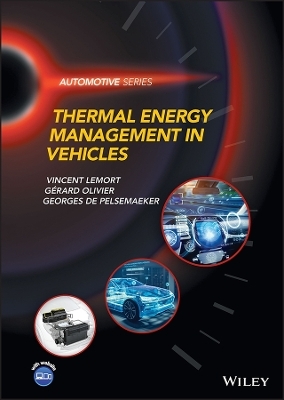
Thermal Energy Management in Vehicles
John Wiley & Sons Inc (Verlag)
978-1-119-25175-0 (ISBN)
In Thermal Energy Management in Vehicles, a team of distinguished researchers delivers a robust and authoritative account of thermal energy management systems and components in vehicles. Covering three main areas—the thermal management of internal combustion engines, mobile air-conditioning, and thermal management of hybrid electric vehicles and electric vehicles—the book discusses and proposes simulation models for many of the components and systems introduced in the book.
The authors also cover state-of-the-art and emerging technologies, as well as likely future industry trends, and offer an accompanying website with supplementary materials like downloadable models.
Readers will also find:
Material that bridges the gap between academia and industry
Proposed simulation models for vehicular components and systems
Fulsome discussions of industry trends likely to take hold in the near future
Accompanying online resources, including downloadable simulation models, on a complimentary website
Perfect for researchers, graduate students, and practitioners in automotive engineering, Thermal Energy Management in Vehicles will also benefit anyone seeking a comprehensive treatment of vehicular thermal energy management systems and components.
Vincent Lemort is an Associate Professor at the Thermodynamics Laboratory of the University of Liège. His research interests include the modeling, testing, and optimization of thermal energy systems. Gérard Olivier worked for many years for Renault Group and filed 70 patents. He was in charge of thermal systems and cabin air quality research activities and served as the expert for innovative solutions for thermal energy management. Georges de Pelsemaeker is the Program and Research & Development Director of the Valeo Thermal System Business Group. He has over 20 years’ experience leading the development of vehicle and engine emission control systems.
CHAPTER 1 FUNDAMENTALS 1
1.1 INTRODUCTION 2
1.2 FUNDAMENTAL DEFINITIONS IN THERMODYNAMICS 2
1.3 FLUIDS 8
1.4 HEAT TRANSFERS 21
1.5 FIRST LAW OF THERMODYNAMICS 28
1.6 SECOND LAW OF THERMODYNAMICS 31
1.7 FLOWS IN HYDRAULIC CIRCUITS 38
1.8 HEAT EXCHANGERS 40
1.9 REFERENCES 48
CHAPTER 2 INTERNAL COMBUSTION ENGINE THERMAL MANAGEMENT 1
2.1 INTRODUCTION 2
2.2 FUNDAMENTALS OF INTERNAL COMBUSTION ENGINES 3
2.3 ENGINE COOLING AND HEATING 24
2.4 OIL COOLING 33
2.5 CHARGE AIR COOLING (CAC) 35
2.6 EXHAUST GAS RECIRCULATION (EGR) COOLING 40
2.7 FRONT-END MODULE 44
2.8 ENGINE WASTE HEAT RECOVERY 50
2.9 REFERENCES 53
CHAPTER 3 CABIN CLIMATE CONTROL 1
3.1 INTRODUCTION 3
3.2 THERMAL CONFORT 3
3.3 CABIN THERMAL LOADS 17
3.4 DISTRIBUTION OF THERMAL ENERGY THROUGH THE CABIN 38
3.5 PRODUCTION OF COOLING POWER 45
3.6 PRODUCTION OF HEATING POWER 75
3.7 LOCAL COOLING AND HEATING SYSTEMS 77
3.8 THERMAL ENERGY STORAGE 79
3.9 REFERENCES 82
CHAPTER 4 THERMAL ENERGY MANAGEMENT IN HYBRID AND ELECTRIC VEHICLES 1
4.1 INTRODUCTION 2
4.2 CLASSIFICATION OF ELECTRIC AND HYBRID ELECTRIC VEHICLES 4
4.3 CABIN THERMAL CONTROL IN HEVs AND EVs 13
4.4 BATTERY THERMAL MANAGEMENT (BTM) 26
4.5 E-MOTOR AND POWER ELECTRONICS COOLING 46
4.6 OVERALL THERMAL ENERGY MANAGEMENT OF ELECTRIFIED VEHICLES 54
4.7 REFERENCES 57
| Erscheinungsdatum | 17.02.2020 |
|---|---|
| Reihe/Serie | Automotive Series |
| Verlagsort | New York |
| Sprache | englisch |
| Maße | 170 x 244 mm |
| Gewicht | 822 g |
| Themenwelt | Technik ► Maschinenbau |
| ISBN-10 | 1-119-25175-3 / 1119251753 |
| ISBN-13 | 978-1-119-25175-0 / 9781119251750 |
| Zustand | Neuware |
| Informationen gemäß Produktsicherheitsverordnung (GPSR) | |
| Haben Sie eine Frage zum Produkt? |
aus dem Bereich


